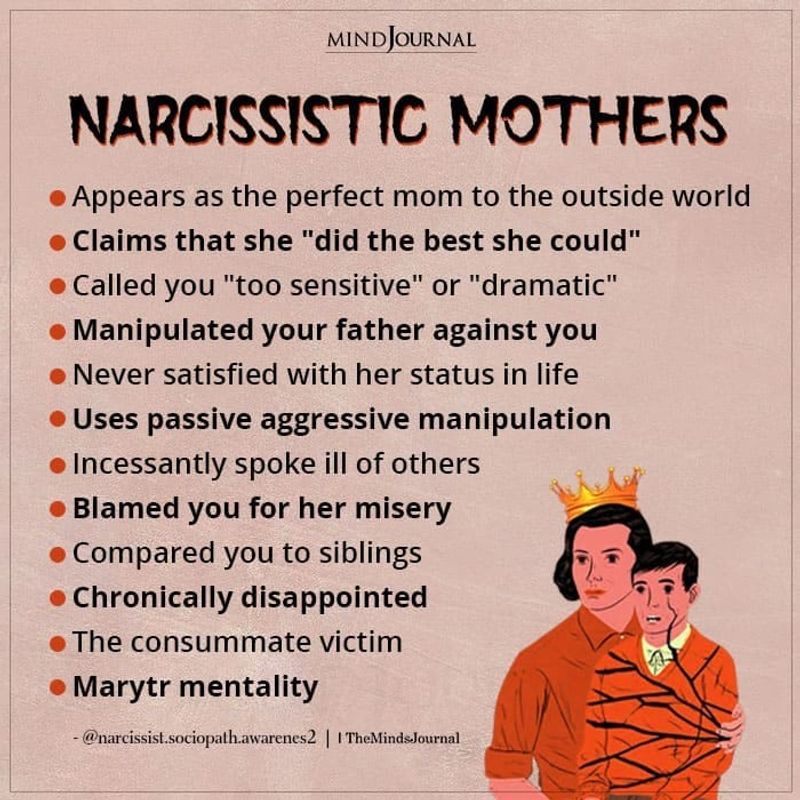17 Signs You Have A Toxic Mother, According To Therapists
It’s hard to admit when the person who raised you is also the one who emotionally exhausts you. But recognizing toxic patterns—especially from a mother—isn’t about blame. It’s about truth.
And sometimes, the only way to heal is to stop denying what’s been hurting you all along. Here are 17 signs that your mother’s love may come with a cost.
1. She makes everything about her—even your pain

In moments of your deepest pain, she finds a way to make it about her. This isn’t just a one-time thing; it’s a pattern. When you try to express your hurt, instead of showing empathy, she might tell you how your feelings affect her, turning the spotlight back on herself.
This behavior leaves you feeling invisible and invalidated. You might start questioning your right to feel upset, as her needs always seem to take precedence over yours.
Over time, you learn to suppress your emotions to avoid the inevitable shift back to her perspective, erasing your emotional experiences.
2. She uses guilt as her primary form of control

Guilt becomes her tool of choice when she wants you to comply with her wishes. If you dare to disagree or assert your independence, you might find yourself bombarded with reminders of everything she’s done for you.
Her words often echo in your mind, making you feel like you’re in constant debt to her. This emotional manipulation can leave you feeling trapped, as if you owe her your compliance.
It’s a heavy burden to carry, especially when your decisions are no longer your own. The guilt lingers, casting a shadow over your every action.
3. She constantly criticizes you under the label of “just being honest”

Her honesty feels more like an attack than constructive criticism. She’ll point out your flaws, often disguising them as honest observations. It’s her way of keeping you small under the guise of being truthful.
These comments can erode your self-esteem, creating a constant inner dialogue of not being good enough. You might find yourself second-guessing your worth, wondering if her ‘truths’ define you.
This so-called honesty isn’t grounded in love but in control, leaving you questioning your value in her eyes and your own.
4. She dismisses or mocks your boundaries

Setting boundaries is seen as an act of rebellion rather than a healthy necessity. Rather than respecting your limits, she might mock or belittle your attempts to create space.
Boundaries become a battleground where your requests are trampled underfoot, leaving you feeling exposed. Her disrespect for your limits teaches you to expect invasions into your personal space.
This lack of boundary respect creates a cycle where you might question your right to say ‘no,’ fostering an environment where your autonomy is disregarded.
5. She plays the victim when you bring up hurtful behavior

When you muster the courage to confront her, the narrative shifts. She dons the role of the victim, and suddenly, you’re the one offering comfort. Her hurt takes center stage, overshadowing your original grievance.
This tactic can leave you feeling guilty for bringing up your pain, and you might even end up apologizing. The cycle reinforces her behavior, as she escapes accountability by shifting the emotional burden onto you.
Instead of resolution, you’re left with the exhausting task of navigating her emotional landscape, leaving your own pain unresolved.
6. She competes with you instead of celebrating you

Achievements become a battleground rather than a reason for celebration. Instead of cheering you on, she views your successes through a lens of competition. Her envy subtly seeps into moments that should be joyous.
This competition creates a rift, as her inability to celebrate your victories leaves you feeling unsupported. Her need to compare herself to you erodes the joy of your accomplishments.
You find yourself downplaying your wins to maintain peace, as your successes inadvertently highlight her insecurities, preventing her from offering genuine praise.
7. She expects constant access to your time, energy, or decisions

Her expectations feel like chains, binding your time and energy to her whims. Personal independence is perceived as an affront, as she demands constant access to your life.
Her meddling in your decisions leaves little room for autonomy, as your choices are met with scrutiny or disapproval. This constant tethering can feel suffocating, trapping you in her expectations.
The struggle to carve out personal space becomes a constant battle, as your desire for independence clashes with her need for control over your life’s minutiae.
8. She brings up everything she’s done for you as a debt to be repaid

Love comes with strings attached, woven through statements of past sacrifices. Her reminders of her contributions serve as a tool to control, rather than expressions of love.
These reminders of her sacrifices become transactions, not memories of nurturing. The sense of indebtedness weighs heavy, creating an obligation to repay her perceived investments.
Her love feels conditional, framed in debts you never agreed to, leaving you questioning the authenticity of her affection and the freedom to live your own life.
9. She gaslights your version of events

Your reality becomes a puzzle as she twists your experiences to fit her narrative. Gaslighting is her tool, making you question your memories and sanity.
Her denial of your truth creates a shaky foundation, as you begin doubting your perception of events. This manipulation keeps you off-balance and dependent on her version of reality.
You end up second-guessing your feelings, and her influence lingers in your thoughts, distorting your understanding of past interactions.
10. She triangulates relationships in the family to stay in control

Family dynamics become her chessboard, with you as a pawn in her game. She sows seeds of discord, ensuring her control remains unchallenged.
The web of manipulation she weaves creates rifts, as family members become wary of each other. Her influence thrives in this division, maintaining her status as the pivotal player.
Navigating these relationships becomes a minefield, as her tactics of triangulation leave you isolated, struggling to reconcile the fractured bonds she orchestrates.
11. She makes you feel responsible for her emotions

Her feelings become your responsibility, as you navigate the emotional terrain she creates. Your attempts to manage her mood swings place an overwhelming burden on your shoulders.
Her emotional dependencies redefine your relationship, as her needs overshadow your own. This dynamic blurs the lines between nurture and obligation, fostering resentment.
Living under the weight of her emotions stifles your own growth, as her happiness becomes your task, leaving little room for your personal emotional development.
12. She treats love like a reward, not a constant

Affection is doled out like a prize, contingent on your behavior. Her love feels like a reward rather than a steady presence, creating an environment of performance.
This conditional love fosters insecurity, as you strive to meet her expectations to receive her affection. The warmth of her love ebbs and flows, dictated by her approval.
The constant quest for her love leaves you exhausted, always aiming to earn what should be freely given, undermining your sense of self-worth.
13. She talks about you instead of to you

Conversations about you happen in your absence, leaving you feeling like an outsider in your own life. Her discussions with others about your decisions or mistakes replace direct communication with you.
This avoidance of direct dialogue fosters a sense of alienation, as you’re left out of conversations that concern you. Her narratives shape perceptions, while your voice remains unheard.
The lack of direct communication erodes trust, as your relationship is defined by whispers and third-party accounts, rather than open and honest dialogue.
14. She punishes independence with withdrawal

Independence is met with the cold shoulder, as she withdraws affection to assert control. Your attempts to assert autonomy are punished with emotional distance.
This withdrawal creates a chilling effect, where pursuing personal growth means risking her affection. The fear of her detachment looms over your attempts to establish individuality.
Her reactions to your independence stifle your growth, as the warmth of her love becomes conditional on your compliance, creating a cycle of dependency.
15. She refuses to apologize—even when caught in the wrong

Apologies are rare, even when her actions warrant one. Her refusal to acknowledge mistakes places her ego above the relationship.
This lack of accountability erodes trust, as her inability to admit fault creates a barrier to genuine connection. Her need to be right overshadows the possibility of reconciliation.
The absence of apologies leaves wounds unhealed, as grudges fester without resolution, creating an emotional rift that widens with each unacknowledged slight.
16. She shames you for traits that remind her of herself

Your similarities become a mirror, reflecting back traits she dislikes in herself. Her criticism of these traits projects her insecurities onto you.
This projection creates a complicated dynamic, where her unresolved issues become your burden. The shame she imparts lingers, as you grapple with traits she rejects in herself.
Her inability to accept these similarities creates a cycle of blame, as you’re left managing the emotional fallout of her projection, affecting your self-identity.
17. You feel a mix of guilt, dread, and anxiety when she calls

Her calls evoke a whirlwind of emotions—guilt, dread, anxiety. Each ring is a reminder of the emotional landscape you’re about to enter.
The anticipation of her expectations weighs heavily, as conversations with her often lead to emotional turbulence. This emotional prelude taints what should be a simple interaction.
Her influence extends beyond the call, leaving you to untangle the emotional knots long after the conversation ends, a testament to her enduring impact on your psyche.







